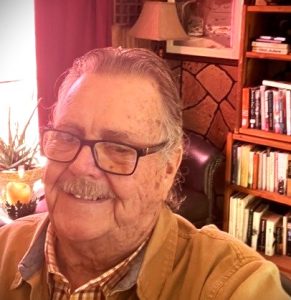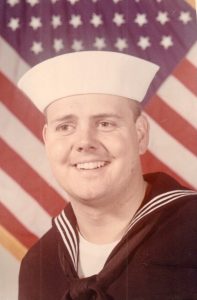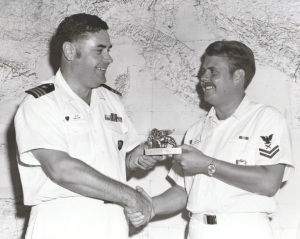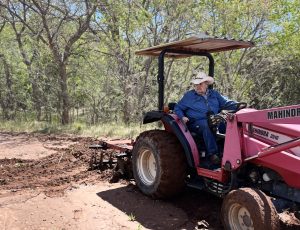
Walt Borton (Navy, YN2) -"Living and Writing His Values"

Walt Borton (former Navy E-5) is an observer of life. He’s honed his writing and strategic thinking skills by participating in decades of political whirlwinds and historical events, and an amazing chain of life choices, challenging military assignments, being in the right place at the right time, and spurts of college studies throughout. His experiences at one political convention accelerated his zest for lifelong learning.Walt Borton (former Navy E-5) is an observer of life. He’s honed his writing and strategic thinking skills by participating in decades of political whirlwinds and historical events, and an amazing chain of life choices, challenging military assignments, being in the right place at the right time, and spurts of college studies throughout. His experiences at one political convention accelerated his zest for lifelong learning.
Political conventions are front and center in most people’s minds at this time during a national election year. Polarized party regulars live for every speech, every moment of incipient optimism, and photo ops with political celebrities in the halls of hotels and caucus meeting rooms. Whether attending one now or decades ago, the impact is gripping and formative. (Sue)
FORMATIVE YEARS. “I was at the 1968 Democratic Convention and it has shaped my life in so many ways,” said Walt Borton, former Navy E-5, anti-Vietnam War activist, and journalist. “I was part of Young Citizens for Humphrey. I supported him after Bobby Kennedy was assassinated. I was in the thick of everything. It was exciting and daunting for me politically because it put an already complicated life-theme in high relief for me. “I was torn; I had too many friends on the other side of the barricades. The situation was a nightmare,” Walt recalled.
I, too, whet my political teeth at that convention, but Walt and I didn’t know each other then. I was a (George) McGovern Girl. I caught the political zeitgeist that still feeds my soul today. I was not in the thick of things as Walt was, but one thing we shared was the ominous feeling of inevitable confrontation between the Daley-controlled riot police and the protestors…. I interviewed Walt in August. As we chatted, we realized our life education spanned similar cultures and locations, historical events, the lure of politics, and a love of writing. (Sue)
Walt was born in Nebraska but lived in central Ohio from fourth grade through his first pass at college. He bears the Midwest work ethic he was raised with and learned about hard work when he was a summer ranch hand in Nebraska. He credits his passion for reading and writing to his doctor’s wife, Mildred Bennet, an English teacher and writer.
MEETING HIS LIFETIME MENTOR: He meandered through college over several years while following his passion – writing and politics. He left the rather staid Miami University of Ohio and found a home at Ohio University, with its strong anti-war community and highly rated journalism program. “This had a profound effect on the rest of my life. I discovered I could write and I welcomed the mentoring of the University’s executive vice president, Jim Whalen,” Walt said. “I wrote for the student newspaper. My first assignment was arts critic and so I got to interview internationally known artists when they visited OU.”
“I went with a group of students to Appalachian Kentucky to work with the VISTA team there. The newspaper stories I wrote led to a job at the university’s Institute for Regional Development (IRD), editing a newsletter and writing proposals for President Johnson’s War on Poverty. Working for IRD began my shift from objective journalism to more advocacy and position-driven writing. It also introduced me to folks who had deep connections with the Peace Corps and the War on Poverty,” he said.
Still going to class, he ran communications for the University Student Government, which was tied closely to the campus anti-war, civil rights, and women’s rights movements, until he answered a call from an OU alumnus at The Associated Press to cover the 1967 New York City Peace March. It resulted in his first national byline. He continued to travel to cover other marches and write for the Athens Ohio Daily Messenger while his grades slid.
He represented OU student government in negotiations with the administration when the university’s non-academic employees attempted to unionize in 1968. When the state refused to allow a bargaining unit to form, the student government led a campus-wide strike, closing the university for two weeks. Jim Whalen kept the National Guard off the campus, and the meat-cutters, janitors, and cafeteria staff were eventually allowed to unionize.
After poor grades ate through his student draft deferment, Walt considered his options. He was surprised by his dad’s position about serving. “Dad enlisted with his best friend, Walt Ormisher, in 1942 just after Pearl Harbor. Orimisher was killed at the Battle of the Bulge. Dad told me if I did not answer when my country called, I would never cross his threshold again. That was big for me,” he admitted. He struggled to balance his reluctance to take anyone’s life in a war he considered unjust and immoral, with his respect for his father. So he met with recruiters in all services and enlisted in the Navy in Columbus, OH, in January of 1969, hoping to serve while minimizing his chances of ending up in Vietnam.

Walt spent boot camp at Great Lakes Naval Training Station near Chicago and A School in Bainbridge, MD. Walt suspects that his time working for a politically well-connected consulting firm in DC between enlisting in January and going on active duty in October, led to his assignment in the Protocol Office for the Commanding Officer of the then NATO Southern Region Command (AFSOUTH) Naples, Italy (now known as the Joint Forces Command, Naples). He rapidly was promoted to E-5 by the time he left the Navy in 1973.
MORE MENTORS IN THE MILITARY. While with AFSOUTH, he found more mentors. “In a lifetime of consulting and management, my most valuable skill has been knowing you have to develop a mission before you can develop an action plan. I attribute that to hours spent running the briefing and war rooms for the AFSOUTH Commander, exposing me to extremely intelligent international military leaders.” Walt said. He learned much from four-star Admiral Horacio Rivero, who commanded the Naval blockade of Soviet ships during the Cuban Missile Crisis and who later was appointed US Ambassador to Spain. “At 5’4” and the first Hispanic Annapolis grad, Rivits (as we called him when he wasn’t in earshot), was a perfectionist. I changed my uniform each time I had to go to his office,” Walt recalled. “I was also influenced by a former Italian Catholic priest, Mario Borelli, who taught in the University of Maryland college program on the base. Borelli had organized social services for the post-WWII children on the streets in Naples. His work is captured in Morris West’s book, Children of the Sun.

While there, Walt also earned ~12 hours of college credits, directed plays for the local theatre group, and became close friends with young USMC Vietnam veterans, assigned to serve out their enlistment with AFSOUTH. “That was my biggest challenge. I was a little older than those guys and ended up trying to help them find their path back to normalcy. My girlfriend’s dad, Marine Colonel David G. Jones, helped me understand how to bring them some of the support they needed,” Walt reflected.
His post-military career kick-started by being in the right place at the right time – again. “I knew I had to get my bachelor’s degree and find a job and before I mustered out, a quirk of fate took me to Boston in July of ‘73, where I met my old mentor from OU, Jim Whalen. He was then President of Newton College. Jim offered me a job as an assistant while I went to BU. By November, I was working full time and going to school full time, helping him merge Newton with neighboring Boston College.
“In the summer of ’75, I followed Jim when he became president of Ithaca College, first as his assistant and then as director of college relations until 1981. Working with an arts group, Ithaca Video Project, I started my own TV production company and then went to work in 1983 as assistant to the chairman of an Ithaca based communications company and by 1984 was vice president. We had radio and television stations and newspapers in 25 states. In 1990, I moved to Los Angeles to run a consulting firm and in 1993 became a freelance consultant in marketing, communications, and management in California and England. By 1996, I was in San Francisco, trying my hand at screen-writing,” Walt concluded.

MOVING TO NEW MEXICO. After a divorce in 1996, Walt moved to Santa Fe to finish a screenplay at the vacation home of his long-time friends, John Morris and Luzann Fernandez. “Morris was a pioneer in theatrical rock and roll production, creating the Fillmore East, managing the production at Woodstock and with his pal Joshua White, setting the standard for tours like Taylor Swift’s Era’s concerts. I agreed to help John write his memoir about his journey and before he died last year, I promised to finish it for him. It’s almost done,” Walt said.
After 26 years in Santa Fe County, he moved to Villanueva in San Miguel County and is loving the proximity to Santa Fe while enjoying the rural, peaceful life there.
Since arriving in New Mexico, Walt’s handled PR for art and antique shows around the country, started a flea market at Santa Fe Downs, and worked as an education and marketing consultant in business and the arts. He ran for the San Miguel County Commission in this year’s primary election. Though he lost, he continues to be active in local politics.
Walt has been in the right place at the right time many times during his adult life. And here he is, taking on the role of communications chair for the Veterans and Military Families Caucus. He’s in the right place at the right time — for our caucus. (Sue)